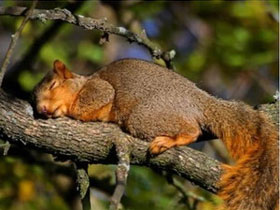Sleeping a lot will help the body resist parasitic disease
According to a new study, animals that sleep longer will suffer less from the "disturbance" of parasitic species thanks to the 'alert' immune cells.
 Dr. Brian Preston of the Max Planck Institute for Anthropology in Leipzig, Germany, led an international research group to demonstrate a new hypothesis that sleep helps improve the immune system.
Dr. Brian Preston of the Max Planck Institute for Anthropology in Leipzig, Germany, led an international research group to demonstrate a new hypothesis that sleep helps improve the immune system.
Brian said that sleep is a mystery of biology. Regardless of whether we control the animal's life cycle and conduct hundreds of experimental works, we still do not have enough answers to the magic function of sleep.
Similarly, no one has yet explained why species have different demands for time for sleep. In an evolutionary ladder, mammals have a sleeping time of 3-20 hours a day.
Brian said: 'Our research provides new evidence that sleep plays an important role in protecting animals from the attack of many parasites, like viruses. bacteria."
Through information on mammal sleep, parameters of the immune system and parasitic species in the host's blood, this scientific work has shown that increasing sleep as required The evolutionary process is closely related to the number of immune cells in the blood.
Mammals sleep for longer periods, significantly reducing the level of parasitic microorganisms in the blood. According to Dr. Preston, sleep adds 'live fuel' to the immune system.
While animals are always in a state of readiness to meet the diverse needs of energy supplies, including the need to seek food, sexual needs and child care. When sleeping, animals avoid most of these activities and therefore can replenish the body's natural protection barrier in time.
- Parasitic amoeba kills cells by grabbing each plate
- Terrible consequences from parasitic worms
- Produces quick diagnostic rods for parasitic diseases
- Take 2,500 eggs of parasitic worms to treat the disease
- The strange disease caused the girl to go on orgasm to sleep
- Strange disease: She was born without an immune system
- 4 taboo while sleeping to avoid harm to the body
- Strange sleeping sickness once spread the nightmare in the world
- Medical mystery reveals a new host of parasitic roundworms on mice
- Horror diseases are not for the weak
- Explaining the phenomenon of the body being jerked when sleeping
- New technique to help learn about African sleeping sickness
 'Fine laughs' - Scary and painful torture in ancient times
'Fine laughs' - Scary and painful torture in ancient times The sequence of numbers 142857 of the Egyptian pyramids is known as the strangest number in the world - Why?
The sequence of numbers 142857 of the Egyptian pyramids is known as the strangest number in the world - Why? History of the iron
History of the iron What is alum?
What is alum?